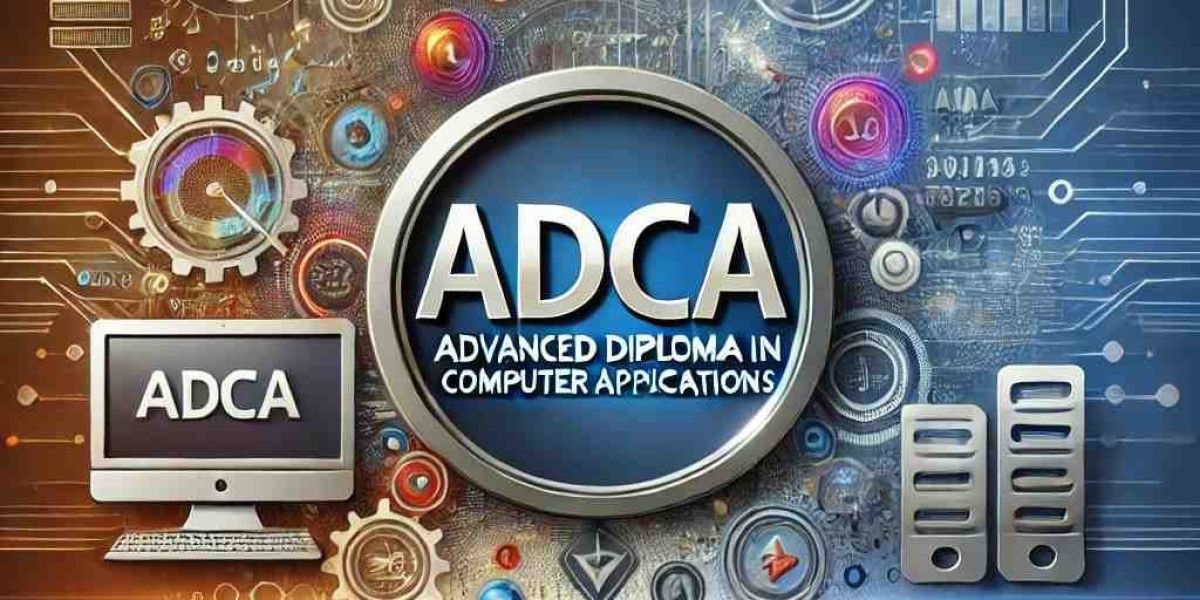In today’s digital-first world, knowing how to use a computer isn’t a luxury—it’s a necessity. From sending emails to creating complex spreadsheets, computer skills have become the backbone of modern education and employment. This is where ADCA (Advanced Diploma in Computer Applications) steps in. It’s a program tailored to equip you with the knowledge and tools needed to thrive in the digital age.
Think of ADCA as a bridge. It connects you to the vast, ever-evolving world of technology. Whether you're a student looking to boost your resume, a professional aiming to upskill, or someone exploring a career change, this course can be your springboard to success.
What Does ADCA Cover?
The ADCA full form, Advanced Diploma in Computer Applications, is self-explanatory. But what does it entail? Let’s dive in.
Basics First
You don’t need to be a tech wizard to start. ADCA courses begin with foundational concepts. You’ll learn about operating systems, file management, and the basic functions of computers. The goal? To make sure everyone, regardless of prior experience, has a solid starting point.Imagine this: You're learning to ride a bike. Before hitting the highway, you need to master balance. That’s what these basics are for.
Office Applications
Word processors, spreadsheets, and presentation tools are central to the curriculum. Applications like Microsoft Word, Excel, and PowerPoint dominate office workflows. ADCA teaches you how to wield these tools efficiently. The result? You’ll create documents that are polished, spreadsheets that are insightful, and presentations that grab attention.Data Management and Databases
Ever wondered how companies manage massive amounts of data? You’ll explore database management systems like MS Access and SQL. These tools help businesses organize, retrieve, and analyze information seamlessly.Programming Basics
Even if coding feels intimidating, ADCA makes it approachable. You’ll learn beginner-friendly programming languages like Python or JavaScript. Why? Because even a basic understanding of programming can open doors to automation, web development, and more.Multimedia and Graphic Design
In an increasingly visual world, creativity matters. ADCA introduces you to tools like Photoshop or CorelDRAW. Want to design a logo? Edit a photo? Create eye-catching flyers? These skills will make you stand out.Internet and Networking
The internet isn’t just for browsing memes. ADCA covers how networks function, internet protocols, and safe browsing practices. You’ll also learn about cybersecurity—essential knowledge in an era of data breaches.
Why ADCA Matters
The truth? Computers are everywhere. Schools, hospitals, banks, government offices—you name it. And the ADCA full form encapsulates what this diploma prepares you for: mastering essential computer applications.
Here’s the kicker: ADCA isn’t just about theory. It’s about practicality. After completing the course, you won’t just know how computers work. You’ll be able to use them effectively.
For instance:
- Writing professional emails? Easy.
- Creating financial reports? Done.
- Designing marketing posters? Check.
It’s like learning a new language. Except instead of Spanish or French, you’re learning the universal language of technology.
Who Should Opt for ADCA?
The beauty of ADCA is its versatility. It caters to a broad audience:
- Students: Boost your college applications and job prospects.
- Professionals: Upskill for better job opportunities or promotions.
- Entrepreneurs: Learn tools to manage your business efficiently.
- Career Switchers: Interested in IT? ADCA provides a solid starting point.
No matter where you are in life, this diploma adapts to your goals. It’s like a Swiss Army knife—useful for anyone and everyone.
How Long Does It Take?
The typical ADCA program lasts for six to twelve months. But don’t let its brevity fool you. It’s packed with value. Each module is designed to provide maximum impact in minimum time. By the end of the course, you’ll walk away with practical, job-ready skills.
The Value of Certification
Here’s a question: Does a diploma matter? In the job market, absolutely. An ADCA certificate signals to employers that you’re not just familiar with computers—you’re proficient. It’s a badge of competence. A testament to your readiness for the modern workplace.
Think of it as your ticket to opportunities. Whether it’s an entry-level job or a stepping stone to advanced IT courses, ADCA opens doors.
ADCA in Real Life: Stories of Success
Take Riya, for example. She was a commerce graduate struggling to find a job. Employers wanted computer skills, but she lacked them. Then she discovered ADCA. Within months, she learned how to create financial reports, design marketing materials, and manage databases. The result? A job as an office administrator with a steady income.
Or consider Anil. A small business owner, he relied on others to handle tasks like billing and inventory management. After completing ADCA, he streamlined his operations, saving time and money.
These aren’t just isolated stories. They’re proof of how **the ADCA full form—Advanced Diploma in Computer Applications—**translates to tangible benefits.
How to Choose the Right ADCA Course
Not all ADCA programs are created equal. Here’s what to look for:
- Reputation: Check the institution’s credibility. Reviews and alumni feedback are great starting points.
- Curriculum: Ensure it covers essential topics like office tools, databases, and basic programming.
- Practical Training: Theoretical knowledge is great, but hands-on practice is crucial.
- Support: Does the institute provide placement assistance? Career counseling? These extras can make a big difference.
Conclusion
ADCA isn’t just a course; it’s an investment. In yourself. In your future. The skills you’ll gain are more than just knowledge—they’re tools. Tools to navigate a tech-driven world confidently. Tools to build a better career. Tools to create opportunities where there were none.
So, whether you’re taking your first step into the world of computers or looking to expand your existing skills, ADCA can be your guide. The ADCA full form may be Advanced Diploma in Computer Applications, but in reality, it’s much more than that. It’s your pathway to a brighter, more digital future.
FAQs About ADCA (Advanced Diploma in Computer Applications)
1. What is the full form of ADCA?
The ADCA full form is Advanced Diploma in Computer Applications. It’s a comprehensive course that equips you with essential computer skills.
2. Who can enroll in an ADCA course?
Anyone! Students, professionals, business owners, and career switchers can all benefit from ADCA.
3. What are the career opportunities after completing ADCA?
You can work as a data entry operator, office administrator, graphic designer, or even a junior programmer. The possibilities are vast.
4. How long does it take to complete ADCA?
Typically, the course duration is between six to twelve months, depending on the institute.
5. Is ADCA a good option for beginners?
Absolutely! ADCA starts with the basics, making it perfect for those with little or no prior computer experience.








